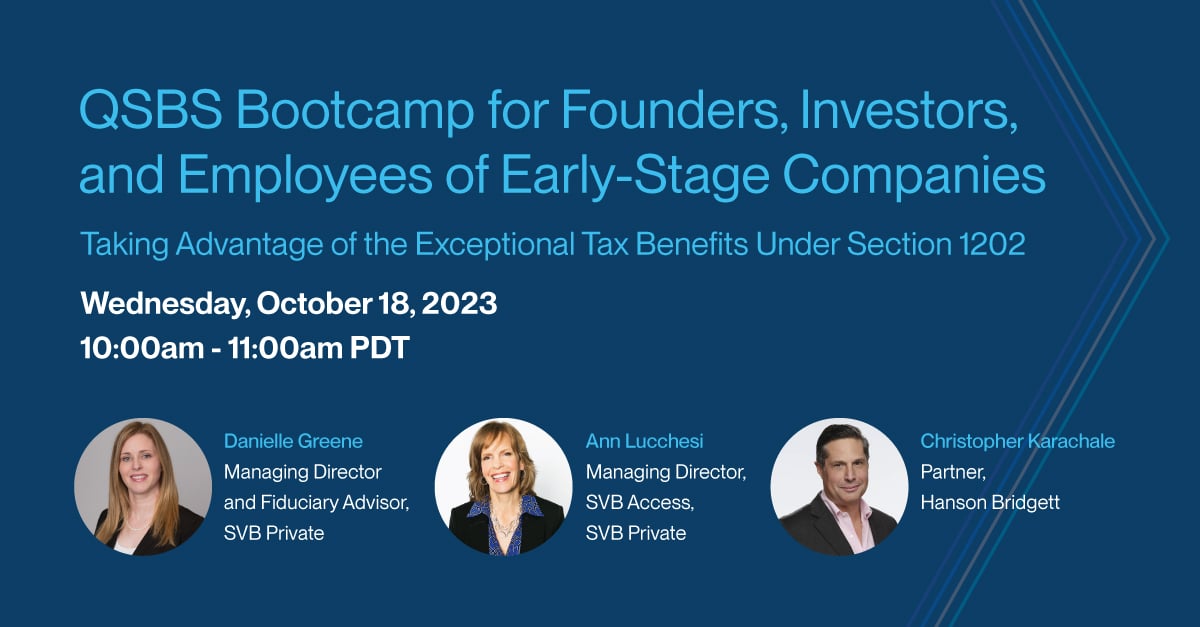We’re pleased to provide you with insights like these from Boston Private. Boston Private is now an SVB company. Together we’re well positioned to offer you the service, understanding, guidance and solutions to help you discover opportunities and build wealth – now and in the future.
How to maintain financial security
According to the 6th annual Women in the Workplace report published by LeanIn.Org and McKinsey, "one in four women are considering downshifting their careers or leaving the workforce" due to issues caused or greatly exacerbated by the COVID-19 pandemic. A lack of flexibility at work, housework and caregiving burdens, and burnout from needing to feel "always on" are among the reasons corporate women are considering stepping back or leaving the workplace entirely. Frustratingly, the health and financial crisis caused by COVID-19 threatens to upend the progress and advancements that women in corporate America have made over the last six years.
While there are definitely days when it feels like 2020 is never going to come to an end, it's important to remember that this crisis isn't permanent. The decisions women make during and as a result of these volatile times, however, can unfortunately have a lasting impact on their financial security. In times of stress and uncertainty, thoughtfully evaluating all of your options, assessing the financial implications of your decisions and maintaining a long-term focus on your personal and financial goals is essential to long-term success.
Potential financial and lifestyle impacts on women
According to the report, the percentage of women in SVP and C-suite positions rose from 40% to 49% over the last six years. Despite this progress, women are often still seen as the primary caregivers of children, elderly parents and others in their families. The combination of school and daycare closures, concerns around senior care facilities and general worries about exposure to the coronavirus have removed many of the traditional sources of help. In addition to the exhaustion and burnout that can come along with all this additional responsibility, the cost of filling these roles with in-home tutors, aides and others can be significant, leaving women to wonder if stepping back or out of the workforce to take on these roles full-time is better for themselves and their family.
Before arriving at this conclusion, it's prudent to carefully evaluate all of your options and assess the full financial and lifestyle impacts of your decision. Questions that you may want to consider and discuss with your family are:
- How would stepping out of the workforce affect your career if you decide to reenter the workforce in the future? Will you be able to return to the position you are leaving, or will you be forced to work your way back up the corporate ladder?
- If you leave the career you've worked so hard to build, how will that make you feel? Will you feel resentful a few months after making your decision, or will you find fulfillment in other areas of your life?
- Are there ways you can work reduced hours at your office or take on consulting work to stay engaged in your career and professional network and still generate income?
- If you are in a two-income household, would it make more sense for the other earner to step back from work instead?
- If you are in a two-income household, is the other person's income sufficient to support your family's basic financial needs if you cut back at work or quit your job?
- Does a shift to part-time eliminate or reduce the benefits you and your family receive from your employer, such as health insurance, group life or disability insurance, or a 401(k) match?
- If your salary is reduced, can you still afford to contribute the same amount to your retirement account?
- If you leave the workforce or move to part-time, how does this reduction in income impact your long-term financial security and future social security benefits?
Corporate women making a career change
Clearly this is not a simple or easy decision for any woman to make, as there are numerous considerations, both financial and non-financial, to evaluate. When making difficult decisions, sometimes it helps to start with small, actionable steps to first focus on what you are able to control. Below are some steps executive women can take when considering a career exit or downshift:
- Take a step back and reassess the current situation. You cannot control the stock or the job market, but you can control your asset allocation, your spending and how you react to volatility and uncertainty. Take some time to revisit the basics: how much income is coming in, and how much is going out? How much are you spending, and what are you spending it on? Oftentimes, individuals do not have a good understanding of their cash flow, and with a little work, it's possible to find places to trim unnecessary expenses that might give you a bit of financial breathing room to reduce your hours at work without feeling the financial strain quite as much.
- Reach out to your employer. Doing so may allow you to fully flesh out your options and negotiate an arrangement. Will your firm allow you to work reduced or flex hours? What benefits or other resources do they offer or could they offer that might help relieve your burnout and financial anxiety? You may have more bargaining power than you think, as research shows that when women are well represented in company leadership, companies are 50% more likely to outperform their peers.
- Revisit your long- and short-term personal and financial goals. Ensure that any decisions you make going forward align with those goals. And if you don't have your goals written down, now is a great time to do that, as research shows that individuals with written plans are more likely to accomplish their goals.
Another exercise that might help you in making this decision is to focus on your values and your "Why of Wealth." When you are able to articulate what is most important to you, this can provide the clarity you need to make decisions that align with your values and help you inch closer to reaching your personal and financial goals.
How SVB Private can help
Once you have a solid understanding of what your wealth is for and what you're trying to accomplish, your SVB Private advisor can help you fully consider your "why" in the context of your long-term financial plan before you make any major decisions. Once your SVB Private advisor has a deep understanding of your "Why of Wealth," your current financial position and your goals, they can help you evaluate different courses of action, create a plan for moving forward and help alleviate any anxiety you may be feeling.
While this article has focused on the impact COVID-19 has had on women in the workforce, it's essential to make sure that you include your spouse or partner in the planning discussion. Each of you should have a good understanding of your current financial situation, what your goals are and the reasons behind the decisions you make. It's also important to keep in mind that financial planning is not a one-time endeavor; it is an ongoing, evolving, dynamic process that can — and should — be revisited and adjusted as often as needed. Periodically checking in with your advisor and letting them know of any changes in your life enables you to tap into the support you need and lower your overall stress.
Keep in mind, too, that while your SVB Private advisor is your go-to for all your financial questions, they can be a valuable resource in many other ways. We have helped our clients find attorneys to review new employment contracts and update estate planning documents; we have connected our clients to professionals that specialize in making health insurance decisions upon retirement; we have collaborated with and on behalf of our clients with eldercare experts and long-term care specialists, and more.
At SVB Private, our advisors take the time to deeply understand our clients and what is important to you. Through open, honest, transparent communication and timely responsiveness, your SVB Private advisor can help you feel empowered even in the face of difficult career choices.














